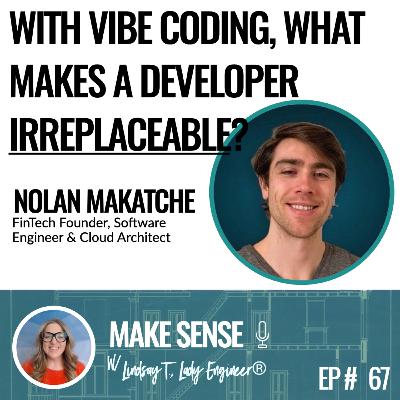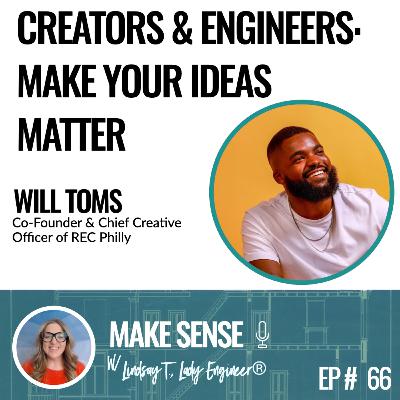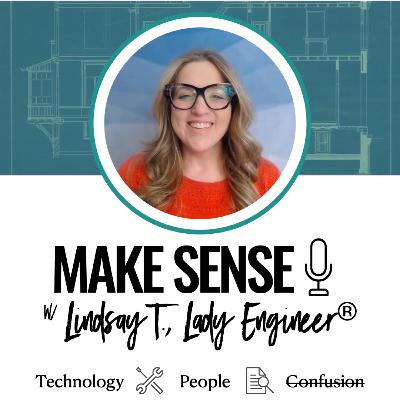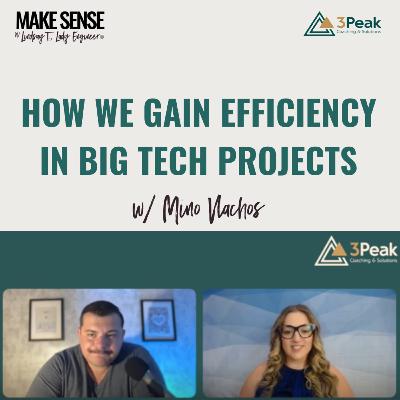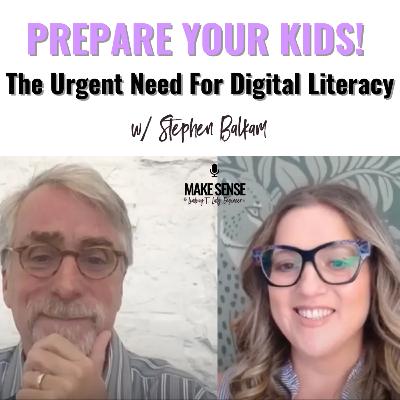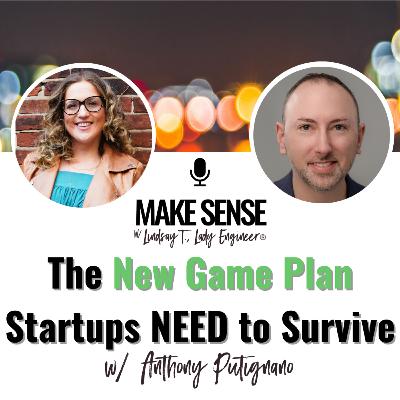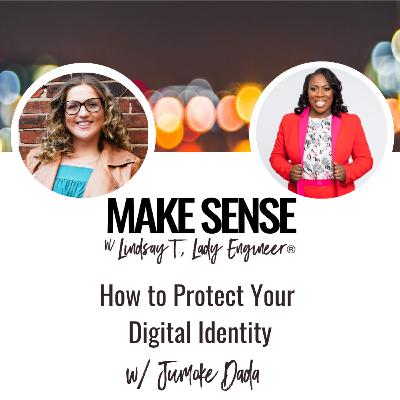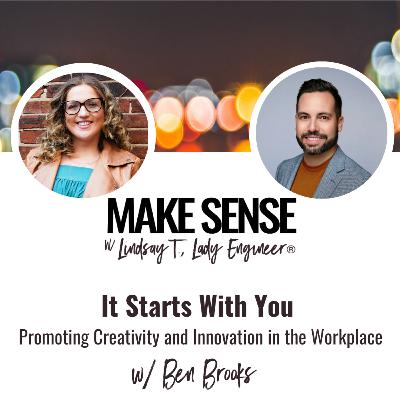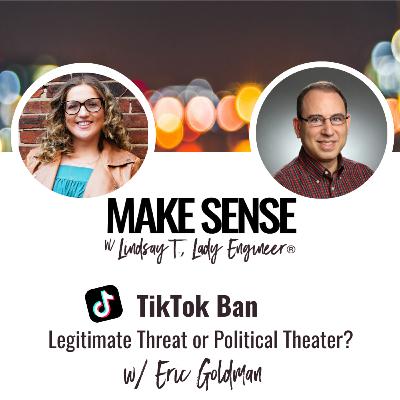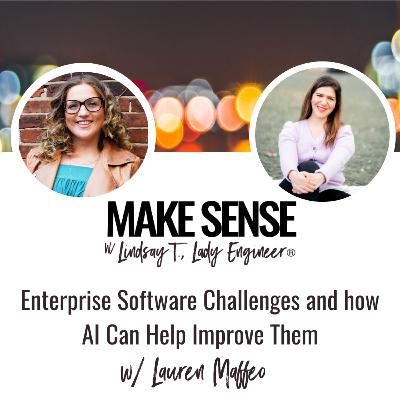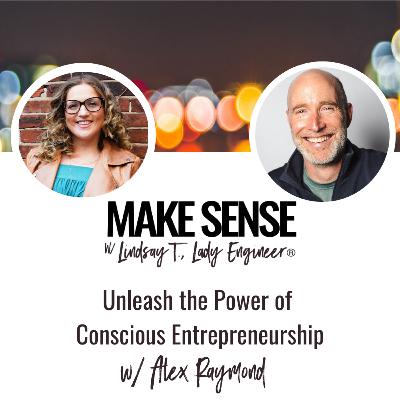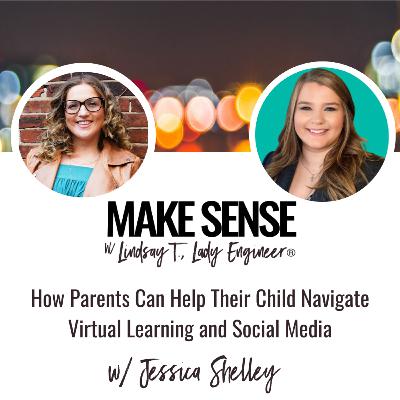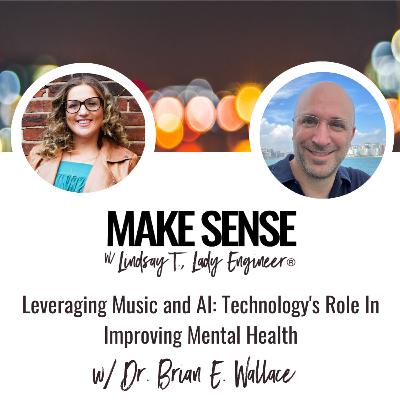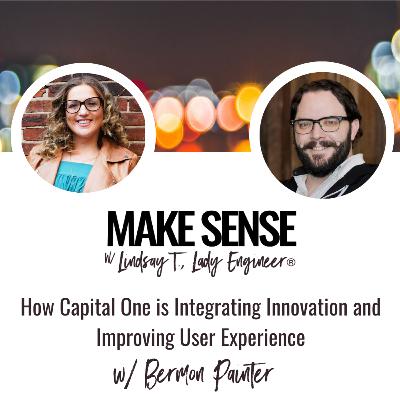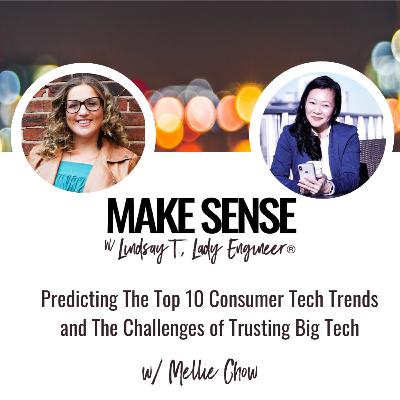Discover Make Sense with Lindsay Tabas, The Lady Engineer
Make Sense with Lindsay Tabas, The Lady Engineer

Make Sense with Lindsay Tabas, The Lady Engineer
Author: Lindsay Tabas, Lady Engineer®
Subscribed: 1Played: 4Subscribe
Share
© Lindsay Tabas, Lady Engineer®
Description
Make Sense is a video podcast where my guests and I untangle the way technology impacts our everyday lives and shapes our world, pragmatically and without the jargon. Whether you're totally hyped on artificial intelligence and ready for the robot takeover, or you want to crawl into a cave after deleting all of your social media accounts, I'm here with my guests to help MAKE SENSE of what's going on so you can design your human experience into the future.
59 Episodes
Reverse
🎙 Episode Title: Fixing Saas: Lessons for the Next AI Startup WaveHow can we make sense of the real AI Saas Opportunity: building better systems from broken ones?In this episode of Make Sense, Lindsay Tabas talks with Benjamin Garvey, Co-Founder and CTO of Common Paper, about the evolution of enterprise software, particularly Software-as-a-Service (SaaS) and how the Zero Interest Rate Policy and the GDP loophole paved the way for a SaaS Boom.. We explore the transition from clunky enterprise software to cloud-based solutions, the challenges faced by the proliferation of SaaS platforms today, and the impact of AI on the future of software development.---🧠 What You’ll Learn:- The key benefits of SaaS tools (e.g. collaboration)- The essential elements any new SaaS startup needs (hint: integrations & APIs)- How understanding user needs will help you stay ahead of AI vibe-coded boom and bust companies---⏱ Timestamps:00:00 – Intro01:35 - Never Have I Ever... 02:19 ...downloaded 12 viruses just to get on mislabeled music track on Napster 03:14 ...gotten in trouble for using Napster or any other file sharing platform 04:16 ....never have I ever put cryptic breakup lyrics 04:46 ...bragged about being a mayor on foursquare 07:20 ....missed Digg but pretended Reddit was just as good 10:20 ...went back in my Twitter timeline to clean it up12:18 Segment Two: Deep Dive on SaaS 13:10 What's the future of the software we use at work? 17:19 Benefits of SaaS: Collaboration and Flexibility 18:12 What benefits did companies gain from going towards Saas? 19:36 The Evolution of SaaS Deployment 21:27 Where did things go wrong for Saas? 23:06 Market Dynamics and SaaS Sustainability 24:04 Zero Interest Rate Phenomenon 24:33 AI's Impact on Software Development 25:55 What are the challenges with a SaaS technology stack? 30:19 Managing SaaS Complexity and App Fatigue 32:25 Lack of Visibility into the SaaS Tech Stack 33:28 The Future of SaaS: Integration and APIs 34:22 Transitioning from Developer to Founder 36:00 Consolidation in the SaaS Marketplace37:36 Segment 3: From Keyboard to Visionboard: The Developer’s Journey to Founder 43:00 Understanding Human Dynamics in Tech Leadership 43:03 Practices or Book Recommendations for Developers 46:41 Wrap Up---📌 Connect with Ben Garvey:Website: https://bengarvey.com/Instagram: https://www.instagram.com/benjamingarveyBlueSky: https://bsky.app/profile/bengarvey.comLinkedIn: https://www.linkedin.com/in/bengarvey/---💡 Dive Deeper:📚 Explore frameworks and tools to apply this episode: LearnProductMarketFit.com📋 Shape the future of the Make Sense Podcast by filling out this form: https://www.lindsayt.com/ms-feedback---🙌 Stay in the Loop:Subscribe here on YouTube for weekly episodes that decode how creators, founders, and innovators make things make sense.
🎙 Episode Title: AI Vibe Coding Era: What Makes a Developer Irreplaceable?How can we make sense of AI vibe coding and whether it will replace programmers?In this episode of Make Sense, Lindsay Tabas talks with @NolanMakatche FinTech founder, software engineer, and cloud architect, about the pros and cons of integrating AI coding tools into a software engineers' toolbox. We explore how AI is shifting the value of developers from coding to critical thinking and problem-solving.---🧠 What You’ll Learn:1. What the current landscape feels like for software engineers and developers2. How developers’ approaches to AI tools vary across different experience levels3. What is "vibe coding" and why do some perceive it as a mind virus4. How, when and who will be replaced by AI programming tools5. The mindset engineers need so as not be replaced---⏱ Timestamps:00:00 – Intro01:45 Segment 1: Never Have I Ever (Internet Edition!)08:50 Segment Two: Your Code Can Be Replaced, But You Can't09:34 What is the current landscape for software developer's work?10:49 What is "vibe coding"?12:39 What's your perspective on "AI is going to take our jobs"?14:00 Is this advice different for "engineers" vs. "developers"?15:25 The Spectrum of AI Tool Adoption17:50 Security Issues When Using AI Coding Tools19:44 The Importance of Code Quality in AI Development21:38 Do AI tools help or hurt the quality of code?23:02 AI's Impact on Job Security in Tech23:26 How do you define what it means to be a great software engineer today?24:56 Should Younger People Be Scared About AI or AI Taking Their Jobs?25:28 Building in Public: Sharing Your Work26:44 From Coding to Problem Solving: The Founder Mindset27:20 How can developers stay relevant and valuable?28:36 Segment 3: From Keyboard to Visionboard - Becoming a founder29:05 How do you go from 'what can I build' to 'what should I build'?30:18 Lesson Learned: I'm doing things differently next time32:38 Communication Skills for Technical Founders34:53 Which product or leadership skills do you see most technical founders struggle with?35:04 Understanding Project Scope and User Needs40:54 Let's Make it Make Sense---📌 Connect with Nolan MakatcheWebsite: https://linktr.ee/nolanmakatcheInstagram: https://www.instagram.com/nolan_makatcheTwitter/X: https://x.com/NolanMakatcheLinkedIn: https://www.linkedin.com/in/nolan-mak/---💡 Dive Deeper:📚 Explore frameworks and tools to apply this episode: LearnProductMarketFit.com📋 Shape the future of the Make Sense Podcast by answering a few questions https://www.lindsayt.com/ms-feedback---🙌 Stay in the Loop:Subscribe for weekly episodes that decode how creators, founders, and innovators make things make sense.
🎙 Episode Title: Beyond the Build - The Mindset Shifts EVery Creator & Engineer Needs to Make Your Ideas Matter w/ Will Toms, Co-founder REC PhillyHow can we make sense of the balance we need to strike between our values and vision, and creating for others?In this episode of Make Sense w/ Lindsay T., Lady Engineer®, Will Toms, co-founder of REC Philly, explores the journey of transforming personal challenges into community solutions through entrepreneurship. Will didn't set out to launch a startup - he just needed the right tools to create and ended up building one that empowers an entire community. Both Creatives & Engineers start independent projects from a place of filling an intrinsic need. At some point, they have to consider who they serve!🧠 What You’ll Learn:- How to honor your vision before worrying about business- What it means to “debug” your creative idea into a sustainable venture- Mindset shifts that help creators balance purpose and profit⏱ Timestamps:00:00 Introduction01:42 Segment One: Never Have I Ever02:06 ...gotten in trouble for downloading music from Napster.04:18 ...played Chat Roulette unironically.07:21 ...woken up thinking in 140 characters because I was using Twitter too much.09:28 ...reorganized my MySpace Top 8 for the drama12:25 Segment 2: Debugging Innovation13:14 How do you protect your creative vision from outside influences?19:51 Can you take us back to the moment in the first space where you realized this wasn't just for you anymore?21:19 Building a Community Through Shared Experiences24:25 The Joy of Empowering Others24:33 How do you help creators stay grounded in their why?31:24 Is there a mindset that you had to unlearn on your path from passion to profit?38:35 What advice do you have for creators who feel stuck?38:57 Staying True to Your Vision40:34 Building Beyond Yourself
Government Efficiency is a hot topic in 2025, given most interactions with the government elicit a groan. But how do real public servants gain efficiency? And, what does innovation mean in a sector where citizens simply need things to work. What does optimizing and streamlining the public sector with technology look like?This episode features Eliza Erickson, a government innovation executive, and host Lindsay Tabas exploring technology challenges in government, including outdated technologies, bureaucratic processes, and the need for a cultural shift towards better service delivery and citizen experience. Eliza shares her insights on how incremental improvements can lead to significant changes in citizen experiences and the importance of attracting talented individuals to the public sector. The conversation emphasizes the need for a balance between innovation and efficiency to enhance government services for citizens.Timestamps:00:00 Introduction02:07 Segment One: Never Have I Ever19:14 Segment Two: Deep Dive on Innovation in Government19:50 Why do so many digital government services feel outdated?23:45 The framework Eliza uses to describe government innovation and technology25:09 The lack of competition in the public sector affects the approach to efficiency28:59 Can Net Promoter Score be implemented for government agencies?31:19 Defining Innovation in the Public Sector36:00 The Risk of Innovation vs. The Risk of Inaction41:43 If it's not "innovation," what is it?44:30 The Future of Government: Attracting Talent for Change#governmentefficiency #publicsectorinnovation #digitaltransformation #citizenexperience #technologyingovernment #bureaucraticprocesses #customerexperience #legacysystems #processimprovement #governmentservices
In this special episode of Make Sense, I ,Lindsay T., the Lady Engineer®, join Mino Vlachos on the 3Peak Master Leadership Experience Podcast ( @3PeakCoaching ) to discuss leadership during periods of technological change. Together, they explore key topics such as:
1. Why do so many expensive corporate IT projects fail, and how can we fix them?
2. How involving employees in the software development process can improve outcomes.
3. What non-IT leaders can do to better partner with their IT organizations.
This conversation is packed with actionable insights for leaders navigating digital transformation. Whether you're managing change in your organization or simply looking for strategies to lead through uncertainty, this episode is for you. Tune in for practical advice on overcoming the challenges of enterprise software and driving successful change in your workplace.
Don’t forget to like, comment, and subscribe for more content on enterprise software solutions and leadership during times of technological shift.
#leadership #digitaltransformation #enterprisesoftware #itleadership #businesstransformation #makesense #technologyinbusiness #changemanagement
This week, I sit down with Marion Siboni, founder of Lacreme de la Stem, to discuss the challenges and opportunities women in technology and entrepreneurship face every day.
Marion shares her motivation for founding Lacreme de la Stem, a community for early-stage female founders in STEM, and discusses the importance of supporting women in tech and innovation. We break down the gender bias in funding and the strategies women use to navigate the investment landscape including building a network before you need it, giving before you get, connecting on personal matters, following up promptly, and being clear on your expectations. We discuss the importance of including men in supporting female founders and the value of including unsuccessful founders as mentors.
Don't miss out on this conversation!
Interested in additional networking tools, check out this complete guide I've created to help you maximize your relationships and get what you want and need out of networking: https://www.learnproductmarketfit.com/product/networking-pdf/
How to connect with Marion:
Website: lacremedelastem.com
LinkedIn company page: https://www.linkedin.com/company/lacremedelastem/
LinkedIn personal profile: https://www.linkedin.com/in/marionsiboni/
Newsletter: https://lacremedelastem.substack.com/
There are three major conversations happening over dinner tables around the world and particularly in the United States. How fast is AI really moving? Is social media okay for the kids? How will the US election go in the beginning of November?
They all seem different right?
Well you'll be surprised how connected it all is as Dan Perkel and I explore the interconnected conversations happening around AI, social media, and the upcoming US elections. We delve into the cultural implications of digital habits, the impact of technology on youth, and the evolving landscape of copyright in the age of AI.
We also have some fun during Make Sense's new segment - 'Never Have I Ever', and reflect on personal digital experiences before transitioning into a deeper discussion on copyright issues related to AI and the ethical considerations surrounding data usage.
Join us as we talk about the complexities of internet morality, the evolving persona of tech CEOs, and the challenges of balancing visionary ideas with market needs. The dialogue emphasizes the need for humility and respect in innovation, advocating for a culture of improvement and interdisciplinary teamwork.
In this episode of 'Make Sense', Lindsay Tabas sits down with Stephen Balkam, founder of the Family Online Safety Institute (YouTube: @fosi ) to discuss the complex relationship between technology, social media, and youth mental health.
We explore the challenges of ensuring online safety for children, the dual nature of social media as both a risk and a resource, and the importance of digital literacy for parents and children alike. You'll walk away with the tools you need to create a balanced approach to online safety for you and your kids that considers privacy, free expression, and the evolving digital landscape.
You don't want to miss this.
Startup unicorns have grown significantly in the past decade, but economic productivity indicators remain stagnant.
I sit down with Anthony Putignano to explore the connection between venture capital and creative waste in the tech industry. We cover everything from the need for a new playbook tech startups need in order to survive, the democratization of technology, DIY software development, and the challenges of over-engineering. We'll also cover some of the latest hot tech headlines, including the role of social media in job searching, the use of AI in customer service, and the spread of disinformation in the digital age.
By the end, you'll walk away know what the signs of wastefulness in companies are, the importance of focusing on customer needs, the importance of focusing on outcomes rather than credentials, the need for more thoughtful and purposeful innovation and how to do better planning and resource management.
In this episode, Lindsay Tabas and Jumoke Dada discuss the democratization of technology, better AI guardrails, encryption for customer data, and the need for organizations to double down on cybersecurity. We break down the role of the Office of the National Cyber Director in the White House and the strengths and weaknesses of the US cybersecurity field. The conversation emphasizes the need for more talent and diversity in the field and the importance of balancing the sharing of vulnerabilities with public safety, like the data security threat posed by TikTok and the debate surrounding its ban.
You'll leave this conversation understanding a bit more about cybersecurity topics like how to protect yourself from scams, the importance of changing passwords, the use of antivirus software, and the risks associated with IoT devices. You'll walk away with the tools to ensure you are vigilant and proactive in protecting your digital identities and personal information.
Show notes
00:00 The Future of Cybersecurity: Trends and Predictions
12:46 The Role of the National Cyber Director: Federal-Level Guidance
14:08 Diversity and Talent in Cybersecurity: The Need for Diverse Perspectives
28:41 Cybersecurity Awareness: Password Protection and Best Practices
31:08 Digital Privacy and Data Protection
39:59 IoT Security and Device Vulnerabilities
44:15 The TikTok Ban and National Cybersecurity Concerns
50:54 Cybersecurity 101: Protecting Your Digital Identity
52:17 Accessing Show Resources and Subscribing to the Podcast
Make Sense is a video-first podcast that simplifies complex issues at the intersection of tech & people. Whether you’re ready for the robot takeover or want to delete all your socials, I’m here to help you make sense of what’s going on so we can design the human experience into the future.
Top 10 Clips from the first 30 episodes! Dive into the most insightful clips without having to watch full episodes by visiting LindsayT.com/MS-Top10.
Individuals are the driving change in the work place.In this conversation, Lindsay T., Lady Engineer® sits down with Ben Brooks, founder and CEO of PILOT inc, to discuss the importance of company values, the impact of technology on work, and the dissatisfaction with enterprise software in today’s workforce. We explore the role of humans need to control technology, the unintended consequences of technology, and its decline in over the years. The conversation delves into the challenges of enterprise software systems, the impact on workplace culture, and the role of individuals in driving change. There is a need for balance between technology and human behavior and how it can promote creativity and innovation in the workplace.
Show notes00:00 Introduction
08:41 Cynical or Sensible: Decoding the Reality of Technology Decision Making
09:59 "We must not accept any technology as the default solution for our problems"
11:10 "Under the pretense of solving problems and making people's lives easier, most of our technological innovations just get people out of the way"
13:00 "Enhancing one job-friendly metric with technological intervention or replacement just leaves other, likely more important values behind."
19:50 Deep Dive: Why do people hate their jobs and what does enterprise software have to do with it?
25:25 Economic indicators of productivity have been stagnant, so it can't be that helpful
36:17 Balancing Technology and Human Behavior in the Workplace
44:30 Promoting Creativity and Innovation in the WorkplaceMake Sense is a video-first podcast that simplifies complex issues at the intersection of tech & people. Whether you’re ready for the robot takeover or want to delete all your socials, I’m here to help you make sense of what’s going on so we can design the human experience into the future. Top 10 Clips from the first 30 episodes! Dive into the most insightful clips without having to watch full episodes by visiting LindsayT.com/MS-Top10.
On this episode of Make Sense, Lindsay Tabas sits down with Eric Goldman discuss the US government's attempt to ban #tiktok . They analyze the #ban on TikTok, its implications for American consumers, and the evidence (or rather lack of evidence) supporting the national security threat allegations. In this conversation, Lindsay and Eric touch on the manipulation of content, the trade war between China and the #US, the spread of #misinformation, and the impact of technology on society. They challenge the idea that TikTok's #algorithm is being manipulated by #china and argue that the focus should be on educating users to discern credible information.
Lindsay and Eric also delve into the issues of data privacy, content manipulation, and propaganda, highlighting the hypocrisy of governments in censoring speech and acquiring consumer data. The conversation raises questions about trust, systemic change, and the need for a holistic approach to address these concerns. They also highlight the importance of questioning all sources, thinking independently, and preserving the positive aspects of the internet.
Show Notes
00:00 Predictions and AI Regulations
10:05 The TikTok Ban and Data Privacy
31:00 Navigating Misinformation and the U.S.-China Trade War
45:54 The TikTok Ban Debate: Implications and Complexities
56:19 Empowering Critical Thinking in the Digital Age
59:22 The Value of the Internet: Fighting for Its Benefits
Make Sense is a video-first podcast that simplifies complex issues at the intersection of tech & people. Whether you’re ready for the robot takeover or want to delete all your socials, I’m here to help you make sense of what’s going on so we can design the human experience into the future.
Top 10 Clips from the first 30 episodes! Dive into the most insightful clips without having to watch full episodes by visiting LindsayT.com/MS-Top10.
On this episode of Make Sense, Lindsay T. sits down with Lauren Maffeo, Senior Service Designer at Steampunk and Author of "Designing Data Governance from the Ground Up", to discuss the disconnect between the hype around AI and the reality of its impact on work. They explore topics from the fear of #ai taking #jobs, the need for better AI #guardrails and data encryption, and the importance of data comprehension over accumulation. Lauren shares her journey from being a journalist, to an award-winning author, to a thought leader in data, AI, and innovation. You won't want to miss her tips if you're an aspiring #writer wanting to get into the #tech industry.
The conversation then focuses on the question of "why does enterprise software suck?" They discuss the challenges like the lack of investment and poor user experience and how implementing AI can help improve these issues as long as organizations have clear business requirements and data governance practices before implementing.
Show Notes
00:00 Introduction and Overview
02:54 The Fear of AI Taking Jobs
10:30 Prioritizing Data Comprehension over Accumulation
15:07 The Importance of Data Governance and Involving Stakeholders
31:55 The Problems with Enterprise Software
33:52 The Role of AI in Improving Enterprise Software
43:47 The Power of Incremental Improvements in Enterprise AI
Make Sense is a video-first podcast that simplifies complex issues at the intersection of tech & people. Whether you’re ready for the robot takeover or want to delete all your socials, I’m here to help you make sense of what’s going on so we can design the human experience into the future.
Top 10 Clips from the first 30 episodes! Dive into the most insightful clips without having to watch full episodes by visiting LindsayT.com/MS-Top10.
On this episode of Make Sense, Lindsay Tabas sits down with Alex Raymond to break down the right mindset entrepreneurs and innovators need to be successful.
We explore the concept of conscious leadership and the importance of taking responsibility for one's life. Alex shares his personal experiences with fear and self-doubt as an entrepreneur and emphasizes the need to challenge and overcome these limiting beliefs. Lindsay and Alex have a personal discussion on the value of embracing failure and the power of vulnerability. Additionally, Alex shares insights on managing customer relationships and the three key responsibilities of an account manager: keeping customers, expanding relationships, and managing expectations.
Learn more about the Conscious Entrepreneur Summit and where to find more information about it and conscious entrepreneurship when you visit https://www.lindsayt.com/the-make-sense-podcast-with-lindsay-tabas/ and explore the most recent episodes.
Show Notes
00:00 Introduction and Mindset for Success
06:37 Immortality as a Service
11:11 Conscious Leadership and Overcoming Ego and Fear
14:55 The Conscious Entrepreneur Summit: Building a Supportive Community
23:28 Navigating Failure: Embracing Learning and Growth
27:13 Overcoming Fear: Managing Fear-Based Actions
37:58 Fostering Creativity and Innovation: The Role of Curiosity and Customer Engagement
45:08 Conscious Account Management: Building Strong Customer Relationships
Make Sense is a video-first podcast that simplifies complex issues at the intersection of tech & people. Whether you’re ready for the robot takeover or want to delete all your socials, I’m here to help you make sense of what’s going on so we can design the human experience into the future.
Top 10 Clips from the first 30 episodes! Dive into the most insightful clips without having to watch full episodes by visiting LindsayT.com/MS-Top10.
Are we addicted to excel?
In this week’s episode of Make Sense, Lindsay sits down with guest Al Chen, Solutions Architect at Coda, to explore the over reliance on Excel in the workplace and its implications. We highlight the use of Excel in Formula One and the broader trend of shadow IT, the limitations of using Excel for project management like the lack of task management features and push notifications.
Don’t worry though, we offer solutions.
We explore two options for moving away from spreadsheets: a rip-and-replace approach where all data is migrated to a new project management tool, and a shadow IT approach where an individual within the company starts using a new tool alongside the spreadsheet and gradually introduces it to the team.
Show Notes
00:00 Introduction and the Excel Addiction
09:42 The Use of Excel in Formula One and Shadow IT
26:06 The Role of Excel as a Reliable and Flexible Tool
36:56 Dear Analyst Podcast & Where To Find Al
Make Sense is a video-first podcast that simplifies complex issues at the intersection of tech & people. Whether you’re ready for the robot takeover or want to delete all your socials, I’m here to help you make sense of what’s going on so we can design the human experience into the future.
Top 10 Clips from the first 30 episodes! Dive into the most insightful clips without having to watch full episodes by visiting LindsayT.com/MS-Top10.
On this episode of Make Sense, I sit down with Jessica Shelley, co-founder of Dailies, to discuss the challenges of virtual learning during the pandemic and the need for intentional design in online education. We highlight the importance of building learning stamina for students and how to provide support and resources for parents.
We shift the conversation to the role of social media in children's mental health, with a focus on the lack of social media etiquette education and the need for parental supervision and the potential dangers of unrestricted access to social media platforms, particularly TikTok. They discuss the concerns surrounding TikTok and the manipulation of its algorithm. If you’re a parent navigating this new online era, or just learning how to be gain more social media etiquette, this is an episode you don’t want to miss.
Show Notes
00:00 Introduction and the Impact of Virtual Learning
06:06 Deep Dive: Trauma of Virtual Learning and Daly's Online Learning Platform
31:08 Updating and Enforcing Regulations
37:56 Concerns of Algorithm Manipulation
44:12 Promoting Social Media Etiquette and Education
Make Sense is a video-first podcast that simplifies complex issues at the intersection of tech & people. Whether you’re ready for the robot takeover or want to delete all your socials, I’m here to help you make sense of what’s going on so we can design the human experience into the future.
Top 10 Clips from the first 30 episodes! Dive into the most insightful clips without having to watch full episodes by visiting LindsayT.com/MS-Top10.
On this week’s episode of Make Sense, I sit down with Dr. Brian Wallace to discuss explores the role of technology in addressing mental health issues, particularly in underserved communities and children. We touch on the future of mental health, including virtual care, remote monitoring, the integration of AI in therapy, evidence-based interventions and the potential of technology to improve mental health outcomes.
Dr. Wallace highlights the importance of personalized care and engagement, especially for children, and the potential for technology to optimize workflows and improve mental health outcomes. He introduces us to his startup, Calmsy, which is developing a game-based therapy for anxiety in children and his other company, Neural Positive, which uses music therapy to improve mental wellness.
00:00 Introduction: Technology-Powered Mental Health Interventions
05:01 Virtual Care and Remote Monitoring in 2024
10:47 Mental Health as the New Annual Physical
20:56 Introduction and Personalized Experience
25:34 Engaging Children in Therapy through Video Bots and Personalized Avatars
29:38 The Role of Technology in Mental Health
43:44 Data Privacy and Ethical Considerations
48:42 Clinical Trials and Future Advancements
52:27 Key Takeaways and Conclusion
Make Sense is a video-first podcast that simplifies complex issues at the intersection of tech & people. Whether you’re ready for the robot takeover or want to delete all your socials, I’m here to help you make sense of what’s going on so we can design the human experience into the future.
Top 10 Clips from the first 30 episodes! Dive into the most insightful clips without having to watch full episodes by visiting LindsayT.com/MS-Top10.
Enterprise software is often clunky and inflexible due to complex systems and technical debt.
This week on Make Sense, I sit down with Bermon Printer to discuss the challenges of enterprise software and the need for organizations to prioritize simplicity and user-centric design in enterprise software. We touch on the importance of data comprehension over data accumulation and highlight Capital One as an example of a company that has successfully integrated innovation and improved the user experience.
Bermon and Lindsay make sense of what composable architecture is an evolution in enterprise software that allows for more flexibility and adaptability by breaking down monolithic systems into modular components that serve specific functions.
Join us for this conversation highlighting the ongoing shift in the industry that is driven by the need for personalized and seamless customer experiences.
Show Notes
00:00 Introduction and the Challenges of Enterprise Software
14:01 Understanding Enterprise Software and its Complexity
25:42 Capital One: Integrating Innovation and Improving User Experience
30:33 The Need for Simplicity and User-Centric Design in Enterprise Software
30:37 The Clunky Nature of Enterprise Software
35:14 Introduction to Composable Architecture
39:55 Benefits of Composable Architecture
41:36 Empowering Marketing Teams
49:19 Enhancing Customer Support
54:25 The Impact on the Employee Experience
On this week’s episode of Make Sense, Lindsay sits down with seasoned angel investor, Mellie Chow to predict the top 10 consumer technology trends for the next five to 10 years. They discuss the future of work, Generative AI assistance, electrification, robots and drones, and augmented mental and physical health and touch on the challenges and concerns associated with trusting big tech companies with personal data and brain-computer interfaces. We highlight the importance of balancing technological advancements with ethical considerations and inclusivity.
Timeline
00:00 The Future of Work: Spatial and Augmented
06:08 Gen AI Assistance and Bring-Your-Own AI
08:59 Electrification of Everything That Moves
12:07 Robots and Drones Take Over Everywhere
14:52 Augmented Mental and Physical Health
26:56 The Metaverse: Immersive and Interactive Experiences
27:40 In-Game Advertising: Reaching Consumers Where They Are
33:35 Sustainability and Regeneration: Addressing the Climate Emergency
39:53 Super Apps: Consolidating Services into One Platform
45:47 Democratizing Accessibility: Inclusive Design for All
49:35 Biometric Authentication: Enhancing Security and User Experience
49:35 Synthetic Creativity: Redefining Reality with AI
Make Sense is a video-first podcast that simplifies complex issues at the intersection of tech & people. Whether you’re ready for the robot takeover or want to delete all your socials, I’m here to help you make sense of what’s going on so we can design the human experience into the future.
Top 10 Clips from the first 30 episodes! Dive into the most insightful clips without having to watch full episodes by visiting LindsayT.com/MS-Top10.
--------
About Mellie Chow
Mellie Chow is an angel investor/venture capitalist, entrepreneur, IT/Technology and Management/Strategy Consultant and Product Innovation Executive with 20+ years of experience across multiple industries including telecommunications & cable, utilities & power generation, banking, healthcare, government, and food. She is a Venture Partner for Archangel Axion and the former Executive Director of Competitive Intelligence, Research and Strategy of a fortune 50 Company.Mellie holds a BS in Mechanical Engineering from the University of Waterloo and an MBA from Kellogg (Northwestern) and the Schulich School of Business (York University). She is currently pursuing her executive leadership and management certification from MIT Sloan. Mellie resides in Philadelphia but will always call Canada home.To Connect With MellieFollow Mellie on linkedIn: https://www.linkedin.com/in/mellie-chow/Axion Fund Report: https://www.archangelnetwork.ca/axion/
On this week’s episode of Make Sense, I sit down with Joe Meersman, a partner at The Collective and an adjunct professor at the University of Texas at Austin, where he teaches visual communication at the School of Design and Creative Technologies. He brings over 25 years of user experience and creative design expertise. discuss big companies' initiatives to adopt AI and the challenges and pitfalls of enterprise adoption.
We delve into the predictions for the future of AI, AI’s impact on the 2024 election results, and the implications of AI for everyday people and the need for human involvement in AI processes. Joe and I get into the various aspects of enterprise AI adoption and problem-solving to help make enterprise software suck less and explore the debate on AI awareness and consciousness, the two schools of thought on AI development, and the challenges of control and understanding of AI.
Timeline
00:00 Introduction
03:01 Crystal Ball: Predictions for AI
08:16 AI and Election Results
11:23 Copyright Cases and AI
18:35 Trough of Disillusionment
23:15 AI Still Needs a Human Chaperone
29:01 Debate on AI Awareness and Consciousness
30:15 Two Schools of Thought on AI Development
31:16 Control and Understanding of AI
32:13 AI's Ability to Connect the Dots
33:40 Garbage In, Garbage Out
34:07 Teaching and Demonstrating with AI
35:27 Inputs, Transforms, and Outputs
36:21 Training Data and User Interaction
39:00 AI's Prone to Hallucination
42:58 Problem Solving and Digital Transformation
Make Sense is a video-first podcast that simplifies complex issues at the intersection of tech & people. Whether you’re ready for the robot takeover or want to delete all your socials, I’m here to help you make sense of what’s going on so we can design the human experience into the future.
Top 10 Clips from the first 30 episodes! Dive into the most insightful clips without having to watch full episodes by visiting LindsayT.com/MS-Top10.



